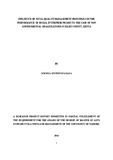| dc.description.abstract | The purpose of this research was to establish the influence of TQM practices on the performance
of social enterprise projects of NGOs in Kilifi County, Kenya. The four objectives of the study
were; to establish the extent to which customer focus influenced the performance of social
enterprise projects, to establish the extent to which top management commitment to TQM
influenced the performance of social enterprise projects, to determine the extent to which total
involvement influenced the performance of social enterprise projects and to find out the extent to
which continuous improvement influenced the performance of social enterprise projects.
Relevant literature on social enterprise projects, NGOs and establishment of social enterprise
projects, literature on TQM practices, literature on perspectives of quality and literature on the
evolution of quality management were reviewed. The study used Kano’s and Taguchi’s quality
theories to support the literature. Quantitative methods were used to collect primary data using
self administered questioner, focused group discussions and observation method. Secondary data
relating to revenue performance was issued by the managers and discussed in the focus group.
75% of the targeted NGOs responded. Findings revealed customer focus directly influenced
productivity, increased customer satisfaction, increased innovation and improved organizational
image. Also it reduced wastages and operational costs though indirectly. Top management
commitment to TQM influenced the level of creativity, innovation and customers’ satisfaction; it
also indirectly influenced new product development. Total involvement influenced organizations
insight on functions. The influence was slightly stronger on employee participation and
empowerment, organizational ability to arrange work in autonomous teams, better decisions,
shaped employee personality, leader’s technical knowledge, decision type, organizational
culture, employee productivity, motivation, job satisfaction variables, level of innovation, better
relations between staff and level of self-governance. Continuous improvement influenced
customer satisfaction, operational efficiency, productivity, better documentation, elimination of
redundancy, greater quality awareness, enhancement of communication, improvement in audit
results, faster and better decision making, greater data reliability, increased risk management,
ability to detect and analyze patterns, it provided the structure to identify the root cause of
nonconformance, facilitated attainment of clients evolving needs, strategic direction and also
created new opportunities to develop or enhance products and services. The combination of all
these influences translated to satisfactory improvement in revenue. Based on this study there is
need for all organizations regardless of the sectors they are operating in to focus more on their
customers, top management to be more committed to TQM, organizations to involve all
stakeholders in their operations and continue to improve in their quest for quality | en_US |



